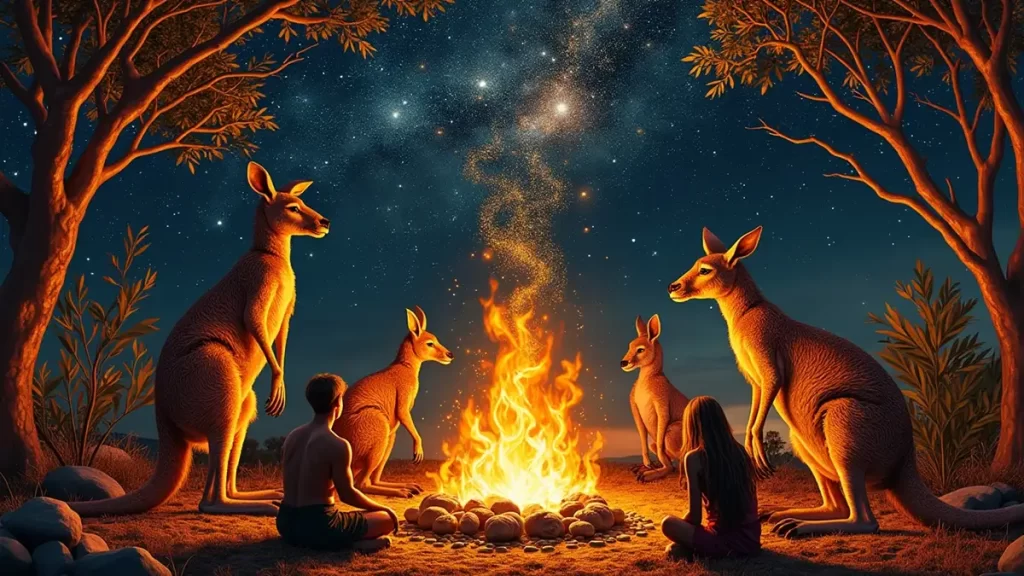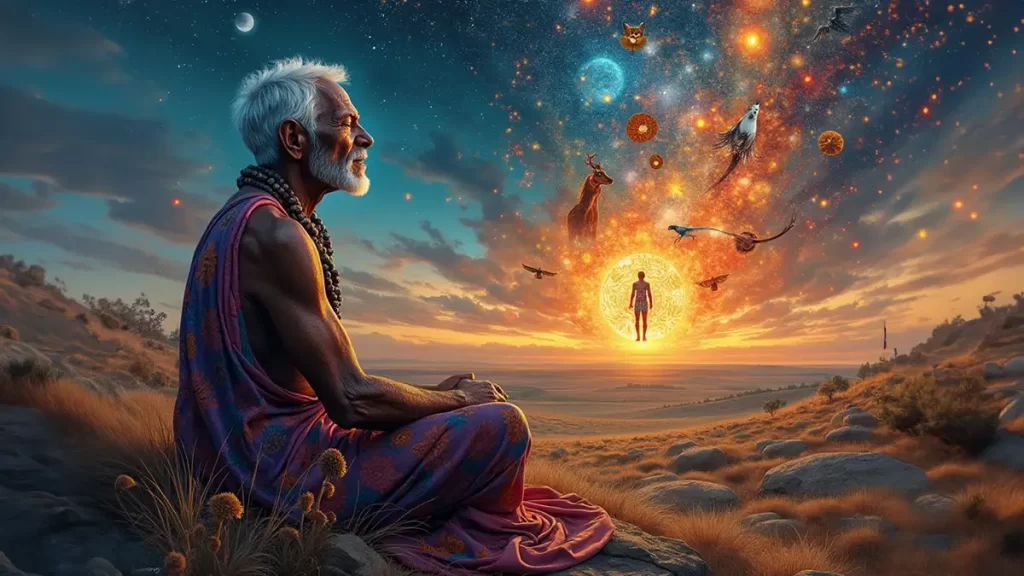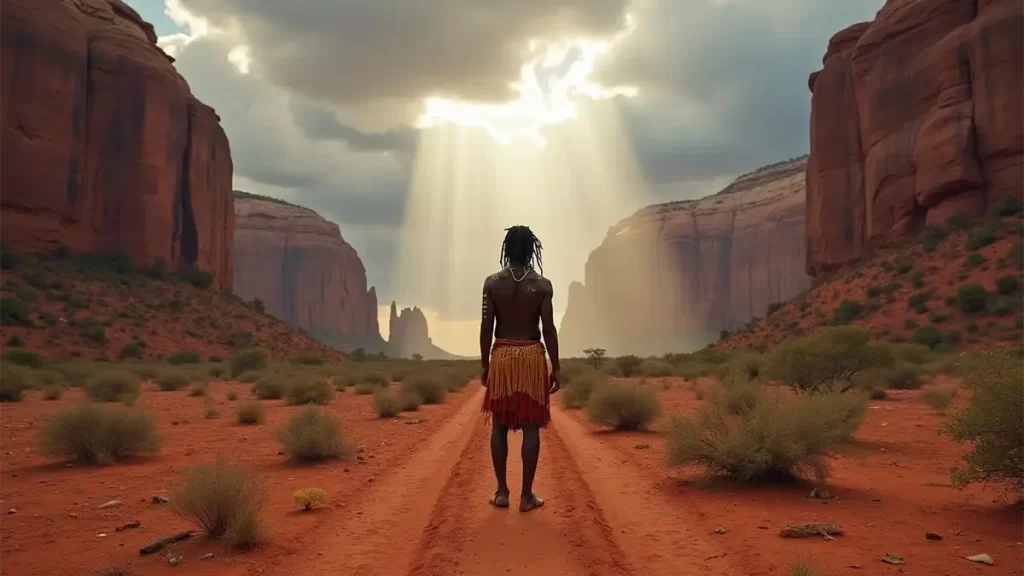Introduction to Dream Rituals
For Australian Aboriginals, dreams aren’t just nighttime adventures; they’re a direct line to the sacred. It’s like a secret language that connects them to their ancestors, guiding their every step.
These Aboriginal Dream Rituals go beyond belief—they’re a lifeline between the physical world and the spiritual one.
Imagine waking up and knowing that your dream just set the course for your day, or maybe even your life. That’s the power of dreams in their culture.
Common Interpretations Across Cultures
Dreams have always been a bit of a mystery, haven’t they? While some folks see them as just our brains processing the day’s chaos, the dream rituals of Aboriginals offer a different take. For them, dreams are sacred encounters, like whispered secrets from the past, present, and future, all tangled up in one.
It’s not about breaking down dreams into tiny pieces like we might in the West; instead, it’s about embracing the whole experience. Bold statement: Dreams are not just dreams—they’re living stories unfolding before your eyes.
Navigate to What Matters
Aboriginal Dreamtime: The Core of Rituals
At the heart of these rituals lies the concept of Dreamtime, or “The Dreaming.” But don’t be fooled—Dreamtime isn’t just about time. It’s a vast, living canvas where creation happens, not in the past, but right now, all around us.
Every time the Aboriginals dream, they’re tapping into this ever-flowing river of life. Through their dream rituals of Aboriginals, they connect with the stories, laws, and spirits that shape their world.
Every dream is a thread in this intricate web of life, holding ancient wisdom that guides them, from the simplest daily task to the most profound spiritual journeys. Imagery: It’s like listening to a symphony where every note is a heartbeat of the universe.
Psychological Perspectives
Now, let’s look at this through a different lens—psychology. Carl Jung might’ve nodded in agreement with the Aboriginal Dreamtime meaning. His ideas about archetypes and the collective unconscious seem to mirror the Aboriginal view, where dreams aren’t just personal but universal.
But here’s the twist—where psychology might take dreams apart to analyze them, the dream rituals of Aboriginals embrace them whole. They don’t just interpret dreams; they live them. It’s like stepping into another world and carrying its lessons back into this one.
How to Understand Aboriginal Dream Rituals
Getting into the heart of these dream rituals of Aboriginals means opening your mind and heart to something bigger than just the dream itself. These rituals are deeply personal, often kept within the community, like secrets passed down through whispers.
But even if you’re an outsider, you can still feel the essence of these dreams. They’re not just personal stories; they’re communal experiences that tie the dreamer to the land, the ancestors, and the very spirit of the universe. Feature: Dreams are not isolated events—they’re part of a larger, sacred journey.
Scientific Insights on Dreaming
While science often sticks to the nuts and bolts of how our brains work during sleep, it’s beginning to peek into the cultural and spiritual corners of dreaming too. Studies on Indigenous practices, including those of Australian Aboriginal spirituality, show that dreams aren’t just about rest—they’re about connection.
Sharing dreams strengthens bonds and identity within the community, creating a web of understanding that goes beyond the dream itself. It’s a reminder that science still has much to learn from these ancient traditions.
Personal Reflection Questions with Answers
1. How do your dreams connect you to your personal or cultural heritage?
My dreams often echo the values and stories that I grew up with, serving as a reminder of my roots and the lessons passed down through generations. They sometimes bring back memories of family traditions or symbols that represent my cultural background, creating a bridge between my past and present.
It feels like my dreams are a way for my subconscious to keep me grounded in my identity.
2. Have you ever experienced a dream that felt more like a message than a mere thought?
Yes, there have been moments when a dream felt like it carried a significant message, almost as if it was guiding me or offering a warning. These dreams stand out because they evoke strong emotions or clarity upon waking, making me feel that there was something deeper at play—perhaps a nudge from my intuition or even a connection to something beyond the ordinary.
3. What can you learn from the Aboriginal approach to dream rituals that might deepen your own spiritual practices?
The Aboriginal approach to dreams teaches me the importance of viewing dreams not just as random events but as meaningful experiences that can guide and enrich my life. Embracing dreams as part of a spiritual journey, rather than dismissing them as mere imagination, encourages me to pay closer attention to the symbols and messages within them.
This perspective can deepen my connection to my inner self and the larger universe, fostering a more profound sense of purpose and understanding.
Conclusion
The dream rituals of Aboriginals offer more than just a peek into a different world—they invite us to listen, to see dreams as sacred, as guiding stars in the night sky of our lives.
Feature: It’s about realizing that reality isn’t just what we see in the daylight; it’s what we carry with us from our dreams. So, are you ready to dive in and discover the sacred meanings hidden in your own dreams?




